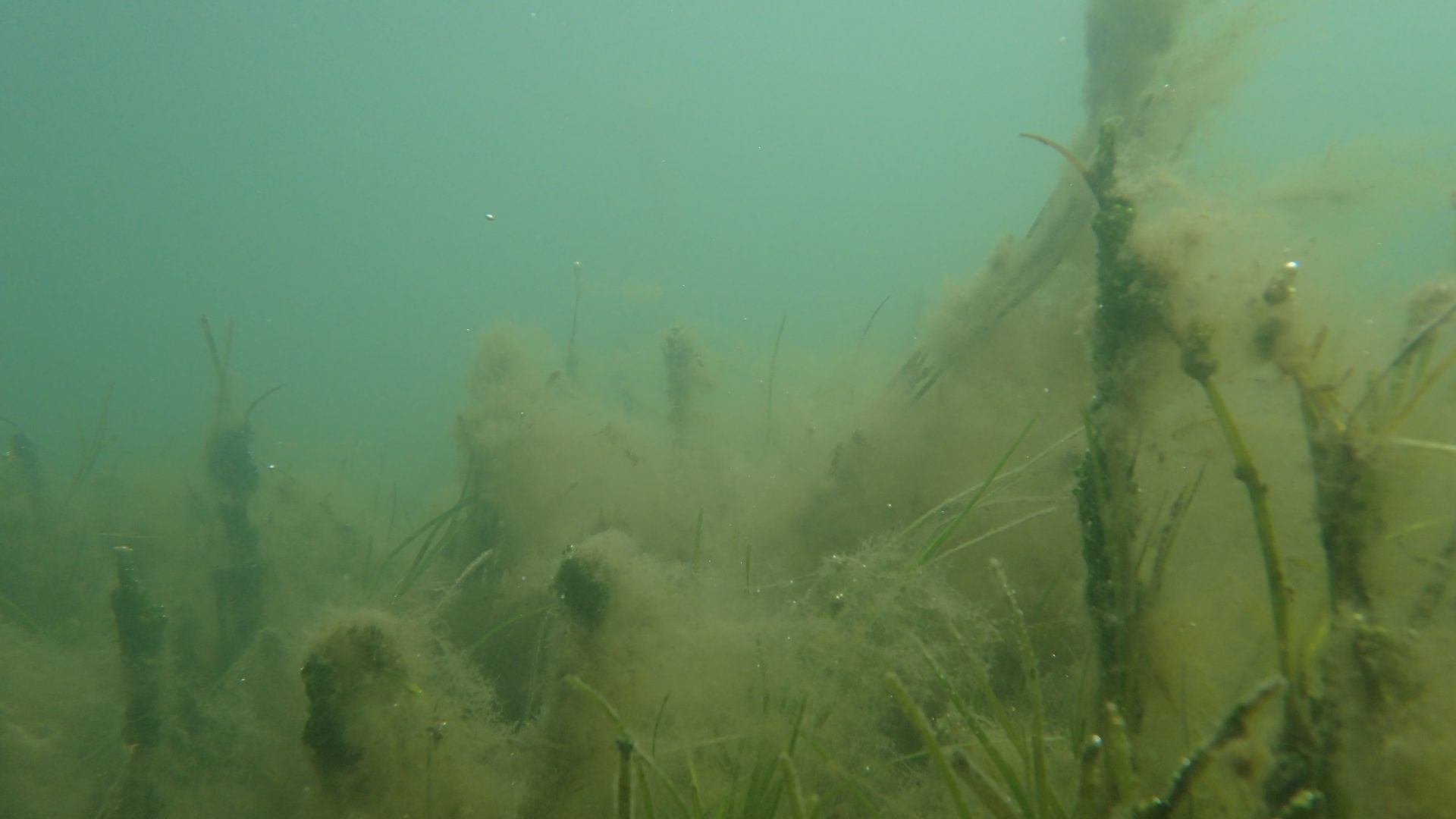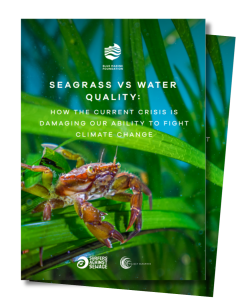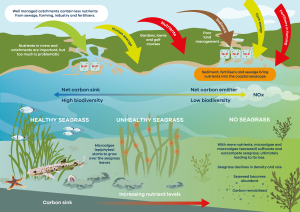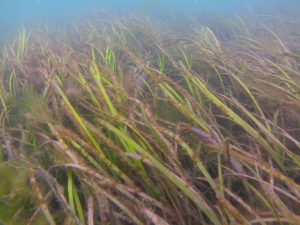
Seagrass Vs Water Quality – Report Launch
Seagrass Vs Water Quality: How the current crisis is damaging our ability to fight climate change

Today on World Seagrass Day, Blue Marine Foundation, Project Seagrass and Surfers Against Sewage have come together to call on the UK Government to take action on water quality, not just to protect human health but also our vulnerable ocean ecosystems which provide a crucial tool in fighting climate change.
Our collaborative report ‘Seagrass Vs Water Quality’ ties together expertise on seagrass, climate change, human-induced pressures and, of course, stinking sewage to paint a picture of what’s happening below the surface of our much-loved waters. The report dives into the sewage scandal in the UK and explores the impacts poor water quality is having on our vulnerable, yet incredibly valuable, carbon storing seagrass meadows.
Why seagrass?
Where do we start. From stabilising sediments and preventing coastal erosion, to naturally filtering our water and removing harmful bacterial pollution from the oceans (which is commonly introduced by sewage), seagrass is a remarkable species with a wide range of ecosystem services on offer. Seagrass meadows are hotspots for biodiversity and provide a wondrous haven for thousands of marine species across the UK. And if you didn’t think they could get any better, you’ll also be stoked to hear that these underwater gardens work as the lungs of the sea, with a miraculous ability to draw down carbon dioxide from the atmosphere and lock it away deep in the seabed (a process known as a ‘carbon sink’). Ultimately, seagrass is a powerhouse of nature-based carbon solutions.
But sadly, seagrass is in a perilous state of rapid decline. In the UK it’s thought that the loss of seagrass might even be as high as 92%. And the limited seagrass habitats still remaining are under increasing threat.
What did the report find?
The problems
- Poor water quality, primarily from sewage discharges and agricultural pollution, has the ability to turn seagrass from a carbon sink into a carbon source.
- 34% of the water bodies investigated around the British Isles were categorised as being in ‘poor’ seagrass environmental condition.
- With 57% of the sites classified as ‘poor’ being located within Special Areas of Conservation, it’s clear that current marine management of seagrass is failing and urgent action is required.

The study also delved into 3 key impacts water quality is having on seagrass meadow health:
- Elevated nutrient concentrations resulting in high risk, fragile ecosystems
Sewage pollution is the main source of phosphates in coastal waters and is known to be one of the largest contributors to nitrate pollution after agriculture. Elevated levels of these nutrients have been found to cause increased eutrophication in seagrass meadows. This can result in declining and fragmented habitats, as well as less carbon being stored by seagrasses. With the values of nitrogen in UK seagrass tissue found to be amongst the highest ever recorded globally, the future of our seagrass isn’t looking good.
- Increased Greenhouse Gas emissions
Due to the highly elevated nitrate levels recorded in seagrasses throughout the British Isles, it’s likely that some of these meadows are now emitting greenhouse gasses (Nitrous Oxides). The decreasing density and the breaking up of seagrass will also begin to destabilise carbon stores, ultimately leading to greater levels of carbon being released. Rather than sequestering carbon (as seagrass would in clean water and healthy conditions), these processes driven by poor water quality will instead feed the fire and contribute to fuelling the climate crisis.
- Poor environmental standards threatening seagrass recovery
Seagrass is widely recognised for the benefits they provide, including their ability to mitigate the impacts of climate change, and organisations like Project Seagrass are working tirelessly to restore seagrass habitats around the UK. But, with water companies chronically pouring eyewatering amounts of sewage into UK waters every day, the conditions in many locations observed currently don’t meet the environmental standards required for effective seagrass restoration. This highlights the potential futility of planting seagrass in certain areas, with sewage pollution knocking us two steps backwards in our efforts to restore seagrass.
So, what can we do?

The solutions
Seagrass is essential to achieving thriving oceans for people, planet and biodiversity. If we don’t act urgently now to remove the significant pressures facing seagrass meadows, they will continue to deteriorate and potentially contribute to climate change. We need genuine effort from the UK and devolved governments to not only uphold the commitments they’ve already established, but to increase ambition and properly deliver effective management of UK coasts – the health of which we all rely on as an island nation.
The report therefore outlines 3 key policy recommendations to address this crisis:
Recommendation 1: The UK and the devolved governments should adequately enforce existing regulations to urgently reduce nutrient pollution, particularly in our estuaries and coastal zones, to prevent the deterioration of key habitats in the fight against climate change.
To learn more about what we’re calling on governments to do in order to End Sewage Pollution, read our manifesto HERE.
Recommendation 2: The Department for Environment Food and Rural Affairs, alongside the devolved administrations should commission research to understand the consequences of elevated nutrients in habitats such as seagrass and their impact on Greenhouse Gas Emissions and on the UK’s Nationally Determined Contributions.
Recommendation 3: UK Government should update the UK Marine Strategy and define specific targets for seagrass meadow health using Good Environmental Status indicators.
Conclusion
The ocean is one of our greatest assets in tackling climate change, and the conservation and rewilding of marine life is vital. However, the ecological vandalism of sewage pollution plaguing our waters in the UK is threatening our precious marine ecosystems, like seagrass. Sewage pollution isn’t just making people sick and ruining businesses. We now know that the ramifications are expanding far beyond local issues, and that sewage pollution is starting to play a starring role on the global stage of climate change.
The report highlights yet another reason (as if we needed any more) on why we must End Sewage Pollution. We need drastic action to improve water quality if we are to begin effectively protecting the large seagrass meadows around our coasts, and mitigate climate change impacts. Until the UK Government begins to adequately enforce its own regulations, and water companies stop shamelessly dumping sh*t into our ocean, poor water quality will continue to affect not only human health, but the delicate marine ecosystems we depend on.
